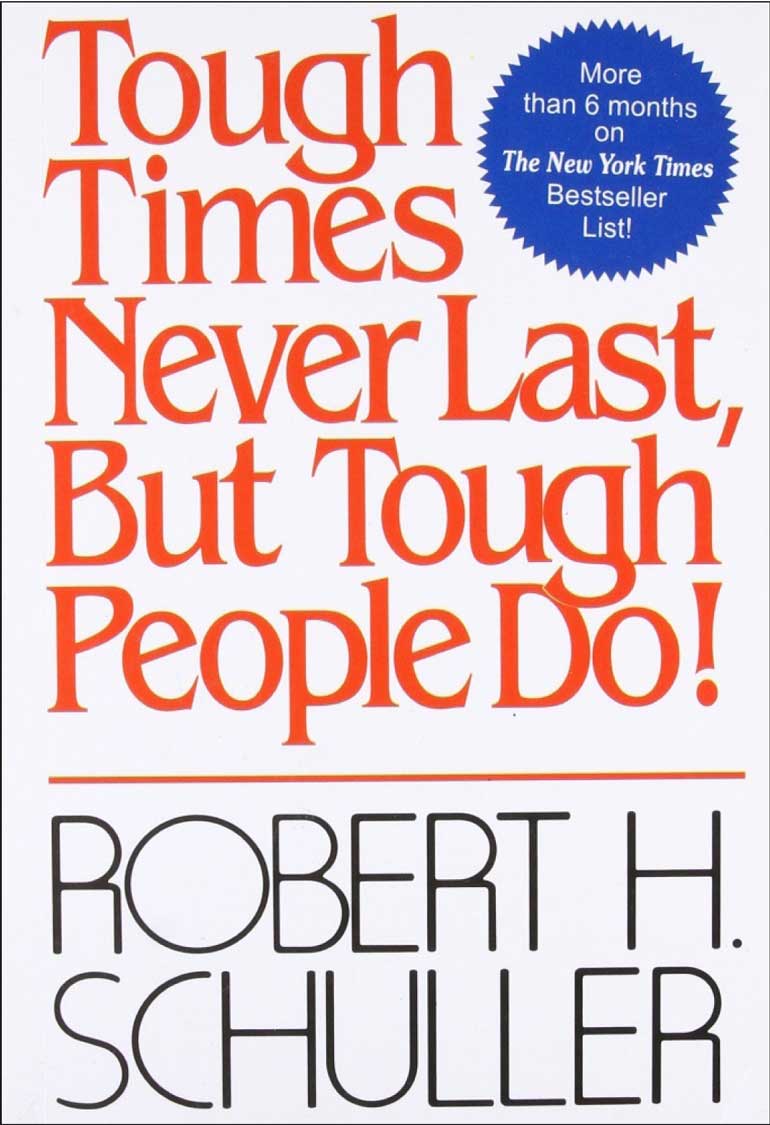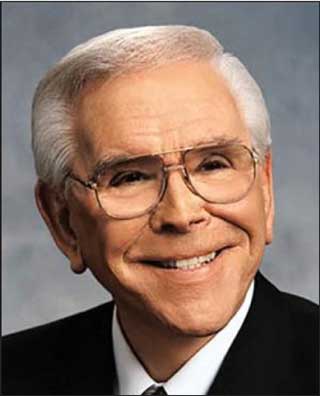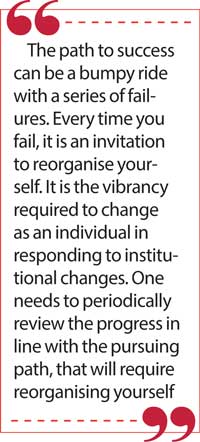Friday Feb 20, 2026
Friday Feb 20, 2026
Monday, 23 August 2021 00:00 - - {{hitsCtrl.values.hits}}

 I rediscovered resilience in rereading a book I first read 20 years ago. It is increasingly more meaningful during the tough times that we all are going through. During my self-imposed home-based working since last week, I reflected on the much-acclaimed best seller ‘Tough times never last, but tough people do’ by veteran motivator, Dr. Robert H. Schuller. Today’s column is an elaboration of an excerpt that highlights 26 action words with a fitting focus on an ‘alphabet of action’ as a resilient response for revival.
I rediscovered resilience in rereading a book I first read 20 years ago. It is increasingly more meaningful during the tough times that we all are going through. During my self-imposed home-based working since last week, I reflected on the much-acclaimed best seller ‘Tough times never last, but tough people do’ by veteran motivator, Dr. Robert H. Schuller. Today’s column is an elaboration of an excerpt that highlights 26 action words with a fitting focus on an ‘alphabet of action’ as a resilient response for revival.
Overview
‘When the going gets tough, the tough get going’, is an idiom that we often hear. Mental toughness is typically associated with courage, confidence, and commitment. In facing life, we are told that you need to have ‘a tough mind and a tender heart’. The challenge always remains in the execution. There are plenty of preachers who advocate precepts for perseverance, but a few set an example through their own actions. Needless to stress that actions speak louder than words. What we need more and more are the ‘preaching performers’ who willingly walk the talk. Dr. Robert Harold Schuller was one such rarity who influenced the world through his words and deeds.
Robert Schuller was a pastor who passionately dreamt of a Crystal cathedral and collectively made it a reality as an edifice for exceptional effort with courage and confidence. He was popular with his ‘power of hour’ preaching that promoted ‘possibility thinking’ in moving beyond mere ‘positive thinking’. It involves consciously evaluating emerging opportunities in exploring options towards making a dream a reality. Born in 1926 in Iowa, USA, and passed away in 2015, he had over five decades of global preaching as a ‘tele-evangelist’ as well as a splendid speaker appealing to many multi-religious audiences. His message is essentially on ‘self-belief’ in bringing out the best in oneself.
 |
| Dr. Robert H. Schuller |
An alphabet of action
In the book, ‘Tough times never last, but tough people do’, Dr. Schuller tells us ‘Here’s how you can be tough too’. ‘When you’ve exhausted all possibilities, remember this: You haven’t’. That’s his advice in
saying ‘beginning is half done’. Let us reflect on his 26 action words contained in the last section of the book, with cognisance of the COVID-19 contagion.
1. Affirm
Schuller suggests that we should affirm ourselves with a ‘can do’ attitude. “Affirm that you can do it. You can find a job. You can change careers. You can learn to walk again. You can recover and not to spend the rest of your life in the hospital. You can make it. You can succeed.” It all begins with a solid affirmation. “I deserve to succeed as much as anyone else.”
2. Believe
According to Schuller, we must believe that somehow, some time, somewhere, through someone’s help, one can achieve one’s heart’s highest goal. “Perhaps this is the year of transition, during which you need to retool yourself intellectually and professionally with a new skill or a new trade.”
3. Commit
It involves committing oneself to a desired dream. “Most people fail right here,” observes Schuller. “With every commitment comes the risk of failure. Nothing devastates or holds people back more than the fear of failure.”
4. Dare
“Dare to try. Dare to love. Dare to make a commitment. Dare to take a risk.” As Schuller observes, “Only a person who risks is free.” One will never progress in solving problems without daring to act.
5. Educate
This involves avoiding shortcuts in engaging in hard years of serious study. “Training may be a grind. But those who are lazy to learn, who never gain the knowledge they could have, weaken their chances for success, because knowledge is power.”
6. Find
An old Roman proverb says, ‘When there is no way, we will find or build one’. A study of the building of the Roman roads confirms that they carried out that attitude. It is the invitation to find, talent, time, tasks as the way we find treasures. “You have great possibilities hidden deep within yourself. They wait to be discovered.” Perhaps, your greatest opportunity is wrapped up today in a blanket called ‘tough times’, says Schuller.
7. Give
A giving attitude is the secret to successful living. “When you are in an institution, your aim should be to make it more successful and more productive than it has ever been before. Giving more than what one gets is a sensible attitude showing one’s serving orientation.
 8. Hope
8. Hope
According to Schuller, hope is simply holding on. “The single most important healing force is hope: hope of recovery, hope of loving and being loved, hope of making it, succeeding.” There is ample evidence locally and globally to show the power of hope.
9. Imagine
“Possibility thinking is actually the exercise of dynamic, creative, sanctified imagination,” says Schuller. Sir Edmund Hillary who attempted to scale Mount Everest, lost one of the members in his team, in the failed effort. It is said that, he during the felicitation ceremony to welcome him back, looked at a picture of mount Everest and had told, “You have defeated me, but I will return. You cannot be any bigger and I can.”
10. Junk
“Junk the junk food of your mind,” advises Schuller. “To be a creative imaginer, you have to throw out tremendous load of junk food that we feed into our minds.” They can be multiple negativities inclusive of prejudices, biases, and wrong assumptions.
11. Knock
“Knock out all kinds of forecasts of gloom and doom.” As Schuller observes, “You may not be able to control everything that happens to you, but you can control how you will react.” Even if the doctor has given you shattering news, you do not have to be knocked down. You can win perhaps over the disease, but most certainly over the depression. It is an invitation to take control of your life by knocking out all forms of negativity.
12. Laugh
Keeping a sense of humour, particularly laughing at oneself will make you relaxed. “You cannot be a possibility thinker unless you can laugh at yourself and laugh at life’s difficulties,” says Schuler. It opens up the pathway to take yourself lightly and your tasks seriously.
13.Make it happen
This is the execution needed to convert a dream to a deliverable. It is how you dynamically manage yourself in implementing the planned actions. “Do you want excitement? Then make it happen,” advocates Schuller.
14. Negotiate
You cannot have your way all the time. That’s where the negotiation matters. “It is better to change the plans while the ship is in the port than to save face, only to sink in the middle of the ocean,” says Schuller. It is to compromise with possible course-corrections yet keeping the desired end in mind.
15. Overlook and overcome
In working as teams, we discover the defects of others, perhaps through avoidable conflicts. “You have to overlook your own and other people’s imperfections. When you overlook, you will be able to overcome.” Schuller’s advice here appears very practical in dealing with people. There are problems that cannot be easily solved. “However, every problem can be overcome, manipulated, or moulded.”
16.Persevere
It is the practice of not giving up. There can be many temptations perhaps with logical reasons to discontinue. There are millions of local and global winners in multiple spheres who showed us the power of perseverance. It is to cling on to what you have committed and to keep going ahead amid frustrating barriers.
17.Quit
“We need to quit complaining,” advocates Schuller. He presents a poem by an anonymous author highlighting the need to quit all negativities.
‘I shut the door on yesterday
And threw the key away.
Tomorrow has no fears for me
Since I have found today.’
18. Reorganise
The path to success can be a bumpy ride with a series of failures. Every time you fail, it is an invitation to reorganise yourself. It is the vibrancy required to change as an individual in responding to institutional changes. One needs to periodically review the progress in line with the pursuing path, that will require reorganising yourself.
19. Share
You can do tremendous things if you do not care who gets the credit. This has been a perennial corporate issue where there is even a local idiom about the ‘elephants who carry loads’ vs. ‘elephants who ceremonially go in processions’. An open mind with a big heart should be willing to share the credit, share the power and share the glory. “Share your gratitude with the people who helped you in making it happen,” advises Schuller.
20. Trade-off
“When you have begun to reorganise and share, then you will have to get ready to trade-off,” our author suggests. That means you will have to decide what you will give up in order to keep what you have got. There are numerous cases where people have to trade-off power for peace, dollars for joy and glory for greater joy of seeing other people grow.
21.Unlock
It invites you to explore your true potential with a right set of values. It also invites you to use the unlocked talent for the benefit of needy others. What the medical profession currently doing across the globe is a fitting example of how the concern for people is shown with the unlocking of values in creating true value.
22. Visualise
“The me I see, is the me I will be,” says Schuller. This has been a repeated advice by many achievers who dared to dream. Thinking positively in visualising success, even in the midst of an adversity is a sure-fire way of reaping reach harvest. It reminds me of what Walt Disney said. “If you can dream it, you can do it.” People from all walks of life who sustained adversity in search of serendipity regularly visualised their future.
23. Work
There is no substitute for work. As Schuller reminds us ‘success is spelt as w-o-r-k’. The problem of some of us is to reach for short-cuts in the guise of ‘working smart’. The hardcore experiences that groom one for life challenges are less in demand, particularly by the new generations. It is true that the technology is assisting us to be smart but working hard in terms of a whole-hearted effort is what brings sustained results.
24. X-ray
“If you are pursuing a job, if you are on your way toward a goal, if you have got a dream, and you have gotten this far, then it is high time you stopped once more and x-rayed your deepest motives,” suggests Schuller. It can be an integrity test in taking your delicate decisions through a ‘moral scanner’. It might not be the what the world would say about you but what you truly discover about your genuine motives. As they say, “When you laugh, the world laughs with you, but when you cry, you cry alone.”
25. Yield
It highlights the need to ‘let go our ego’. It reminds me of the famous song from Frozen movie, that invites Princess Elsa as ‘let it go, let it go, can’t hold it back anymore’. It has an eastern appeal of detachment and a western appeal of divine providence. Such a move will provide you inner peace and joy. It is a way of preventing anxiety and undue worry.
26. Zip it up
“With self-confidence in believing your capability, you can zip it up,” says Schuller. It is consolidating all actions beginning with letters A to Y, with a deep inner conviction. That is the crux of possibility thinking in showing the multi-faceted toughness.
Moving ahead
The secret to succeed in being tough during tough times is the possibility thinking. The alphabet of action advocated by Robert Schuller is a promising recipe for a resilient revival. Revisiting Schuller and relating his thoughts to our pandemic times could be a worthy endeavour for enduring success.
(Prof. Ajantha Dharmasiri, former Director of Postgraduate Institute of Management, can be reached through [email protected], [email protected] or www.ajanthadharmasiri.info.)